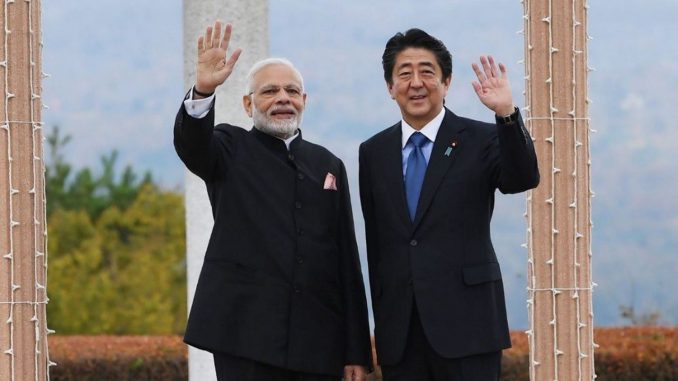
Prime Minister Narendra Modi said that he and Japan Prime Minister Sinzo Abe have agreed that from digital partnership to cyberspace, health to defence and from oceans to space, both sides will strengthen their partnership.
New Delhi: Prime Minister Narendra Modi and his Japanese counterpart Shinzo Abe agreed on Monday to deepen economic and defence ties, including the launch of a 2+2 dialogue of foreign and defence ministers, against the backdrop of China’s growing influence in the region.
During Modi’s two-day visit to Japan for an annual summit, the two sides committed themselves to work for peace and stability of the Indo-Pacific, with Asean unity and centrality at the heart of the concept, and identified joint projects they could take up in Sri Lanka, Myanmar, Bangladesh and Africa.
The two countries signed a $75 billion bilateral currency swap pact that is expected to bring stability to foreign exchange and capital markets at a time when the value of the dollar is rising.
They also signed over two dozen other agreements in areas ranging from agriculture and digital technology to infrastructure, including a key pact between the Indian Navy and Japan’s Maritime Self-Defense Force to expand maritime domain awareness, as Japan offered low-interest loans worth 316.4 billion yen ($2.8 billion). Abe, who last week became the first Japanese premier to visit China in seven years for talks aimed at easing tensions, indicated he saw Tokyo and New Delhi playing a stabilising role in the region.
“Strong relations between Japan and India are the foundation that will sustain the region,” Abe said in a joint statement with Modi after talks in Tokyo. “A strong Japan benefits India and a strong India benefits Japan…Japan and India will take the lead for stability and prosperity in the region,” he added.
Modi said Japanese investments will create some 30,000 new jobs in India and the two leaders had pledged “to pushour cooperation at an uninterrupted speed”.
“The 21st century is a century of Asia,” Modi said in comments translated into Japanese. “There are questions – who will predominate and what should be done? It is clear that there won’t be a century of Asia without cooperation between India and Japan.”
While reaffirming their desire to deepen security and defence cooperation, the two leaders decided to institute a 2+2 foreign and defence ministerial dialogue, an arrangement that India currently has only with the US. They also welcomed the start of negotiations on Acquisition and Cross-Servicing Agreement (ACSA), a military logistics pact that will enhance strategic depth and defence cooperation. ACSA will allow Japan to refuel and resupply its ships at Indian naval bases on the Andaman and Nicobar Islands near the Malacca Straits, a maritime choke point through which seaborne trade passes to ports in China and Japan.
Though neither Abe nor Modi mentioned China, it was apparent that their efforts were aimed at balancing China’s expanding influence in the region. They reiterated their commitment to work for a “free and open Indo-Pacific”, with “ASEAN unity and centrality” at the heart of this concept to ensure the region is “inclusive and open to all”, the joint vision statement said.
Source: Hindustan Times

Leave a Reply